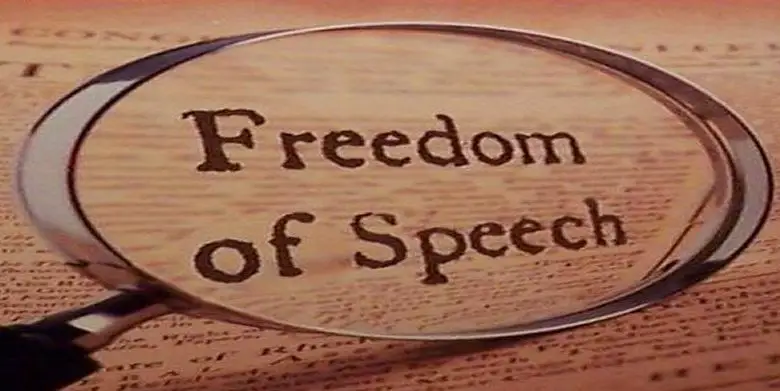
Disability and the media: free speech is everything
Comedian and blogger Ted Shiress, who recently wrote for us about disability and using escorts, talks about the media and his desire for free speech.
I don’t care what others say, Derek is a fascinating and provocative program. It got me thinking: able-bodied people have carte blanche to say what they like about disability in the mainstream. But, the articulate guy with a disability, who doesn’t quite discuss disability in the way that the media want, gets silenced.
I’m a comedian, but you probably haven’t heard of me because I’m not high enough up the ladder yet to get paid enough to make trips around the country. However, you would have had three chances to see me on TV. Yes, I’ve been lucky enough to have been approached by production companies eager to milk every cooperate dollar out of my stand-up and views on disability, and I had too little dignity to protest.
 However, after filming the pilot came the brick-wall. The TV channel decided that the fact that my jokes come from a place of disability-prompted frustration and cynicism, my views are too much of a contrast to how they want to illustrate disability.
However, after filming the pilot came the brick-wall. The TV channel decided that the fact that my jokes come from a place of disability-prompted frustration and cynicism, my views are too much of a contrast to how they want to illustrate disability.
Isn’t the fact that I am up there trying to make people laugh proof enough that I’m not morbid at all? Even parking my egotism I find this quite sickening; why should I get told how I should approach my own disability?
The irony in this nanny-like attempt to not be seen offensive is that it is just that: offensive! The media want to show their little crippled angels wearing a smile and talking about how great life is regardless.
Well I’m sorry, but I don’t. In fact, I find the concept of disability pride, and forcing people to wear a smile no matter what life throws at you, quite disgusting. I’m exaggerating a bit. However, I don’t see how being told a slightly more cynical yeah-you-did-get-dealt-a-bad-hand outlook on disability is ‘offensive’? Yes, I accept not everyone shares my views and humour, and I wouldn’t want everyone to. But in a world where Ricky Gervais can say ‘mong’ freely, how is someone giving their own views on THEIR OWN disability such a taboo?
This need to silence me seems obscenely patronising; it’s as if we are too weak to face any opinions that might challenge our own. But, it was just yesterday someone walked past me saying “Timmeh!” [South Park reference] Yes, it was a pretty nasty and unnecessary move that could have offended. But I’m used to it and just considered it water off a duck’s back. The sad truth is that most people with disabilities encounter episodes like this daily and just rise above it, we acquire a thick skin very early on in life, and if we can take that then we must be able to take anything.
I used to wave the ‘person with a disability’ flag as high as I could, although I never wanted my identity defined by being a ‘disabled person’. But there were those who told me otherwise, which actually just made me more vocal. Then, one day, my friend Nicola took the unusual approach of not blasting me with anger but providing a well-constructed argument as to why she disagreed with me. Although I’m not entirely comfortable in aligning myself in the ‘disabled person’ camp, I do now say ‘person with a disability’ with far less conviction (damn you, Nicola!). This episode is surely evidence that allowing free speech does not create conflict but reduces it.
One of my favourite comedy moments involves a tale of an incredibly violent, horrific and sexual encounter with Jesus. To put it in context, this is the crescendo to a superb show about his year on the run from right-wing Christians; a show that was called blasphemous by many. This is a perfect example of what often happens when people have their free speech challenged: they will go further than necessary to make a point! It’s pretty much the same reason I enjoy using words like ‘crip’ and ‘spazz’; if people are denied the right to say what’s they think is right, then they get more tempted by what’s wrong.
Not mentioning names but there is a charming disability campaigner who has found a great way to reach harmony with all her Twitter followers: block everyone who doesn’t agree with her points of view! Added to this, she is pro-Derek, so that ‘block’ button has had some pressing recently. Although I don’t want to blast her, it begs the question as to what she feels this is trying to achieve. How can she say she’s campaigning for the rights of those with disabilities if she actively ignores half of them?
My previous piece for Disability Horizons was about feeling free to have sex with anyone at whatever the cost, so to conclude this piece I’ll now contrast that by saying: one must mass-debate freely!
PS. Come to one of my gigs if you’d like a taster of my jokes. If I’m on form I’ll prove to you that one can still be cynical towards having a disability while enjoying life to the max.
PPS. If you disagree with anything in this article then get in touch so we can talk freely. Or just block me!
By Ted Shiress
Find out where Ted Shiress is next performing and get in contact with him on his blog.
Check out…
• Road to independence: strippers, bars and US Marines…
• The Sessions film review.
• The Last Leg: what do you think?
We’d love to know what you think about this, so get in touch by emailing us at editor@disabilityhorizons.com, messaging us on Facebook, tweeting us @DHorizons or leaving your comments below.
Congrats to Ted. Some of us agree with every word.
Some excellent points – it seems ‘freedom of speech’ is only for the media elite, or for anyone who will parrot what the mainstream media want to convey. And the disability rights movement in general should be open to all points of view if it doesn’t want to alienate the people it is trying to represent.
Just in case this was lost in DH’s fantastic attempts to clean up my waffling: The show Stewart Lee got into trouble for was Jerry Springer: The Opera, which he directed, the backlash to that caused him to write the stand-up show involving the encounter I mentioned.
I know that doesn’t matter at all, but I’m the kind of geek who just HAS to clarify these things.
Bravo. Well said. Keep speaking out. I have a list of 4 letter words I find vulgar as someone who has lived for over 32 year with a chronic illness. Among them are words like hope and cure which are bandied about like gospel. But I know there ain’t no hope for a cure for me so those using those words aren’t thinking about me. You’ve touched on a huge issue – the marginalization of people who don’t fit society’s norms, whether through body or mind differences. Our education system doesn’t teach us how to speak with people of difference, people who can’t share the same experience due to some form of life limiting condition, so we’re left awkward and uncomfortable in situations where we’re unprepared.
I can remember one incident over 20 years ago when my disease was flaring and I was in high fever but nevertheless went to express my condolences to a friend who’s father had passed away. As I entered her apartment my brain was frying from the fever and I felt detached from reality. I bent over, kissed her on her cheek, took her hand and said quietly, “Congratulations”.
I’m putting the word “free” on my four letter word list.
Zal Press
http://www.patientcommando.com